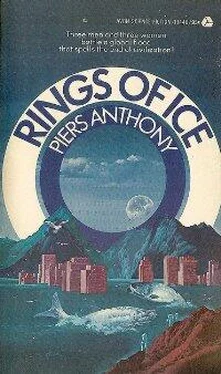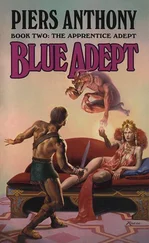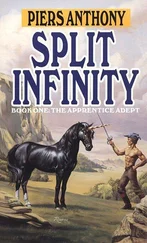“Too simplistic,” she said. “The mere presence of ice rings will not guarantee a usable focus of light. They would have to be precisely oriented. And the ice would soon melt, because Earth is much closer to the sun than Saturn is. And the energy required to divert the nebula even slightly—”
“Here are the calculations,” he said with military smugness. “You will see that the orientation is, indeed, precise—an equatorial orbit angled to provide the necessary amount of reflection. There will be four rings, the outer ones shielding the inner ones from precipitous heat so that they will not melt rapidly. The system does not have to be permanent; it is projected to last fifty years, during which period more durable sources of energy will be developed. And as for diverting the nebula—”
He paused with a satisfied smile. “Come this way.” He showed her a gravity-free chamber in the center of the station. “Observe the cloud of ice crystals on the left,” he said. He pushed a button, and a jet of vapor shot out, making her feel inexplicably queasy. The water quickly crystallized, forming a cloud of frozen particles that drifted on toward the center of the chamber.
“Now observe the action of Substance J-2.” A smaller jet came from the opposite side, but this did not crystallize. “Only a twentieth the volume of the ice, and far less than that in mass—but an interesting reaction.”
Zena already knew better than to inquire into the chemical identity of “J-2.” These people guarded their secrets jealously, with or without reason. An offshoot from sinister researches?
The J-2 cloud met the ice. The explosion that resulted was soundless, since the chamber was airless. Ice shot out in a hemisphere—and the main body of the ice cloud reversed course. “Explosive interaction,” the man said. “The J-2 is almost completely destroyed, but the recoil shifts the direction of the remainder of the ice. This will work in deep space as readily as here, as it occurs in a vacuum. J-2 is cheap, as these things go; all we have to do is fire the proper quantity to intersect the nebula at the proper angle, and it will change that nebula’s course.”
“It needs more consideration,” she said, though she was impressed. It appeared that they really could bring the nebula to Earth! “There are too many opportunities for error, and we don’t know what effect such a series of rings would have on the climate of the planet.”
“That’s why we brought you in,” he said. “The conservation lobbyists squawked like a bunch of chickens when they heard about this—we’re running down the source of that information leak now—and demanded a reassessment. Well, we’re reasonable. You have forty-eight hours to study the proposal before implementation.”
“Two days!” she exclaimed. “I can’t begin to appraise it in that time! It will take weeks on a computer to consider the meteorological impact—”
“Sorry—our computer’s tied up. But we have plenty of paper and a pencil for you. You’ll find everything’s in order.”
She felt another pain. “No, Thatch—of course it doesn’t hurt,” she said, wincing.
The figures did seem to be in order, on gross examination. But they were all military figures, provided by the organization that had worked out this grandiose plan. Therefore they were suspect.
“By the way,” the officer said as the two days expired. “There has been a small modification. The original attitude of the rings was inefficient for reflectivity, so the orbits have been changed from equatorial to polar. That will put the rings broadside to the sun, as it were, instead of edgewise. That one small change will multiply the reflective power a hundredfold, with no increase in investment.”
Zena was stricken. “But the heat! The rings will melt and disintegrate!”
“Oh, they’ll break down faster than they otherwise would have—but even as little as a decade will provide more power than half a century the other way. It is well worth it, since our power crisis is now.”
“But the water!” she cried. “What do you think will happen to it, once the rings melt?”
“It’ll dissipate in space,” be said nonchalantly. “Some will fall to the ground. What of it?”
“What of it! Have you any idea what that amount of water would do to the climate of the planet? It would be the second Deluge!”
“Let’s not exaggerate,” he said. “Now it is time to watch the J-2 missiles being launched. This is a great moment for Earth!”
“You can’t do it!” she cried. “This is a disaster! At least run the revised figures through your own computer and get a projection for the time of breakdown. If—”
The officer frowned. “I knew it was a mistake to let a flighty civilian in on this. Our computer is occupied with more important matters than a rehash of a minor variation in one project. Now are you going to watch the launch or aren’t you?”
“The rape of Earth!” she cried. “You don’t know what you’re doing!” It was like a physical pain, a literal rape, making her writhe.
“I’m sorry,” Thatch said. “I—I got carried away, I guess. Did I hurt you?”
Zena reoriented. “Oh, no, of course not, Thatch!” He had hurt her, but she knew she must never admit that. “I was remembering things.”
“Were you—were you ever raped?” he asked, looking at her with concern.
Not before this! “Thatch! What a notion! Of course not.”
“You screamed something about rape—”
The rape of the Earth. “No, that was figurative. I— never mind! I must have passed out, and dreamed. Reliving something that happened weeks ago. Nothing to do with you.”
“You passed out?” He sounded disappointed.
What should she say now? “This experience—it was too much to assimilate all at once. My mind must have shied away. I’m sorry if it made it worse for you.”
“No, you were very much alive! I thought—” He broke off.
She had a certain sympathy. He had thought she was writhing with the pangs of fulfillment, when actually she was reliving the colossal blunder that had precipitated the deluge. What a blow to his fragile ego!
“You did the right thing,” she told him. “Thank you.”
“You’re welcome,” he said disconsolately.
Her stomach started to heave. She turned her face aside quickly—but it was a false alarm. It was laughter.
“So it is an annular system!” Gus exclaimed. “Just as Vail said.”
“Close enough,” Zena said. “I don’t know whether there was ever a natural one, but we have an artificial one now.”
“It’s natural! All you did was divert the nebula to bring it near Earth. Everything else happened just the way Vail said. If there’s one ice nebula, there must be others; if even one passed Earth, it would account for everything.”
“Yes,” she said, not having the energy to quarrel. She still hurt from the siege of the night before, and from her prior injuries and exertions.
“Except for one thing,” Gus said. “You say this ring was in polar orbit, not equatorial. So it wouldn’t act like Vail’s rings, would it?”
“That’s complex to ascertain. Certainly the polar ring is less durable—in fact, it broke down in days, not years. But what the exact pattern of rainfall would be—”
“In the Vail canopy, the rain falls mostly at the poles,” Gus said. “At least it does at first. The sky opens up, there, in a kind of circular window, and the stars shine through. We had our rain right here—the canopy never really formed.”
“We certainly did have rain right here!” Gloria said. She was cooking something appetizing from unappetizing scraps: her special talent, much appreciated by the group. Gordon, oddly, could not cook well at all.
Читать дальше










